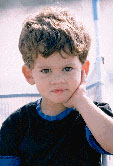
MONDAY, July 2 (HealthDay News) — A new study suggests that children whose parents or siblings have schizophrenia or bipolar disorder may be at a higher risk of developing autism spectrum disorders.
Researchers led by Dr. Patrick Sullivan of the University of North Carolina at Chapel Hill came to their conclusions after studying the medical records of people in Sweden and Israel.
A family history of schizophrenia was strongly connected to autism disorders in children, almost tripling the risk, the team found. Children with a first-degree relative with bipolar disorder also had higher odds of developing an autism disorder, but the effect was less pronounced.
It’s not clear how schizophrenia and bipolar disorder might be connected to autism disorders. The research didn’t prove that either of these psychiatric disorders actually causes autism, only that there is an association.
Instead, all three disorders might have causative factors in common.
“Future research could usefully attempt to discern risk factors common to these disorders,” Sullivan and his team wrote.
One expert wasn’t surprised by the findings.
“Clinically, we have known that these disorders have been linked for some time,” said Dr. Victor Fornari, director of the division of child/adolescent psychiatry at North Shore-LIJ Health System in New Hyde Park, N.Y. “Future studies may clarify the nature of the etiological [causative] link.”
The study appeared online July 2 in the journal Archives of General Psychiatry.
According to the U.S. National Institute of Mental Health, studies assessing the prevalence of autism spectrum disorders “have reported varying results.” A 2009 survey conducted by the U.S. Centers for Disease Control and Prevention, however, found that, among 8-year-olds, one in every 110 children may have such a disorder, with boys at much greater risk than girls.
More information
Find out more about autism from the advocacy group Autism Speaks.

